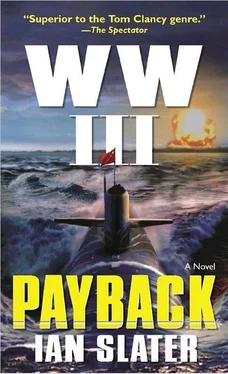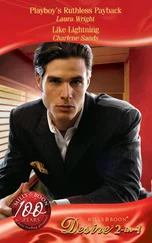“Not long now,” Freeman advised Choir, as the Galaxy entered a “shelf” of bone-rattling turbulence at ten thousand feet, the Welsh-American’s face having taken on a pucelike pallor.
“Should’ve eaten somethin’, mate,” advised Aussie loudly, “ ’fore we left Hawaii.”
“He did,” said Sal, winking at Chief Petty Officer Tavos and the four other SEAL volunteers. “A banana and a slice o’ white bread — you know, the old diarrhea diet.”
“No, no,” Aussie corrected Sal, “I meant a meal —you know, a mess o’ fried eggs, bacon, nice greasy side of fries, and—”
“You wicked bastard,” Choir mumbled weakly.
Freeman smiled at the give-and-take between Choir and Aussie, their ongoing teasing a measure of his team’s morale. Sal’s winking at Tavos and including the four other SEALs in the joke was the kind of small but deliberate act of inclusion that the general knew was crucial if the team was to execute what he, in one of the greatest understatements of his career, had referred to casually in his airborne briefing as “pre-mission DOPAE”—deplaning of personnel and equipment. It was an innocent-sounding acronym, which one of the SEALs, Eddie Mervyn, confided to his colleague multilingual Johnny Lee, must have originated in someone’s dope -smoking mode.
“No way, Eddie,” Lee assured him, smiling. “Closest the general’s come to smoking a joint, I heard, was when he went to a strip joint looking for terrorists in Washington State.”
Eddie Mervyn, checking his weapon of choice, a Heckler & Koch 9mm with folding stock and laser-dot targeting, commented, “No terrorists in a strip joint. Muslim fanatics don’t drink or watch tit.”
“Exactly,” said Lee, “but the scuttlebutt is, the general cottoned to the idea that strip joints’d be the perfect cover for terrorists in the States. No one in Homeland Security’d expect that a fundamentalist fanatic would go to the tit shops and hit the booze, right? Perfect cover.”
Bone Brady was impressed. “So Freeman figured that out?”
“Yep,” said Lee.
The general made no comment, his attention drawn to the six-wheeled equipment that was shuddering in the turbulence. He loosened his harness a tad so he could lean forward from the team’s bench and tighten one of the lines.
Aussie, to the four SEALs’ amazement, had nodded off, his legs sticking out, his feet resting on his combat pack and almost touching one of the bright orange “glo” Air Force HIBUDs—“hi-buoyancy” drums — that had been lashed down below the equipment’s pallet.
“Can see he’s worried,” the loadmaster joshed before he made his way through the narrow space to inform the general that they were fifteen minutes from the carrier battle group McCain off the island of Ullŭng.
“Thanks, Sergeant,” acknowledged Freeman. “Would you ask the driver to put it through on-screen?”
“Yes, sir.”
As the flat screen came alive, they could see the Galaxy’s line of descent toward Ullŭng Island, 170 miles east-southeast of Kosong on the North Korean coast, the Kosong warehouse on the SATPIX — satellite pictures — being ten miles north of the DMZ. Whether or not the team would head the 92 miles in to the South Korean coast then head up along the coast, passing over the DMZ, or head instead directly to Kosong would be something Freeman would decide after — or rather, if —the deplaning of personnel and equipment succeeded, and after he received updated real-time intel. The latter could be provided only by the Signals Exploitation Space, the ultrasecret “blue tile” room with its “Big Blue” screen located deep in the inner sanctums of the McCain , as the carrier steamed at reduced speed off Ullŭng, protected by its battle group’s screen of cruisers, destroyers, and two nuclear attack submarines.
The screen’s data-block read, “TD2”—time to drop zone—“14 minutes.”
“With this headwind that’s hitting us now,” said Salvini, “I’d say it’ll be more like twenty minutes.”
“Want to bet on it?” joshed Freeman.
“Bet?” It was Lewis, suddenly awake and sitting up. “Did I hear bet ?”
Freeman smiled knowingly at Brady, who was sitting immediately to the general’s right. “Aussie’d bet on the sun not coming up. Next to watching that so-called football game down under, ‘Australian Rules’—an oxymoron if I’ve ever heard one — Aussies are addicted to beer and gambling.”
“Yeah,” Salvini called out above the sustained roar of the Galaxy’s turbofans. “An Aussie gets wounded, they transfuse him with Foster’s Lager.”
“Foster’s, my ass!” Aussie corrected him, sitting up and assuming the air of an outraged connoisseur. “I only drink Castlemaine. That’s Castlemaine Four X to you , Mr. Salvini.” Aussie turned to look along the bench to the tall African-American. “What’s the bet, Shorty?”
“Data-block up there,” explained Brady, indicating the screen, “is telling us it’s fourteen — no, thirteen — minutes to the drop zone. Sal thinks it’ll be longer.”
“Ten minutes,” came the pilot’s warning, the headwind having now dissipated.
“Damn!” said Aussie. “I could have made some money.”
The red light was still on but already the Galaxy’s ramp yawn was under way, the great plane’s huge door lowering like the jaw of some airborne leviathan, the whine and howl of its hydraulic pressure lines mixing with the rush of cold air invading the huge, warm cave of the plane’s interior.
Far below, they could see a vast, cobalt-blue sea, wrinkled and flecked here and there by the short-lived whiteness of breaking waves. The loadmaster and another crew member released the tension lines. The crated equipment, which included the team’s eight individual eighty-pound combat packs, Freeman not needing one insofar as he’d been ordered by the President to stay at mission control, slid noisily but evenly down over the rows of precisely aligned rollers.
The drogue chute pack attached to the palletized load followed it out into the void in a long taper of bundled lines, the sudden unraveling and reefing of the three enormous nylon conical-ribbon drogue chutes, each 83.5 feet in diameter, sounding like a thousand tents struck by a banshee wind. The noise was so alarming that for several moments, before the tripetal blossoming of the drogues’ dazzling white canopies a half mile aft of the plane, Johnny Lee instinctively stepped back — onto Eddie Mervyn’s combat boots. Mervyn’s obscenity was unheard by his diving buddy, given the combined maelstrom of unraveling lines, slipstream, engine noise, and the racket created by the hundreds of well-oiled floor rollers still spinning, despite their load having exited, descending toward the sea. It was a sea that, given the centuries-old conflict between the two countries, was claimed by both Korea, as the East Sea, and by the inheritors of Nippon, as the Sea of Japan, even before Japan’s annexation of Korea in 1910 and its brutal domination of the country until 1945.
“Go!” shouted the Air Force sergeant. The team stepped into space, Freeman and his first four from the ramp’s starboard side, Aussie and the remaining three from the port side, the roaring wind so cold, so fast, it took their breath away, heart rates increasing, the dot of Ullŭng Island coming up at them fast.
Then each man felt the sudden jerk, his body rising as his Mach III Alpha — the high-glide tactical parachute — took over. With the best glide-rate-to-descent ratio of any Special Forces chutes in the world and its eighteen ripple-arc panels and independently flexed left/right control cords, it allowed its jumper unprecedented maneuverability, despite each commando’s heavy combat pack.
Читать дальше












